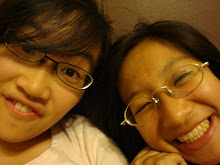6/30/2010
You and Me--I've missed you
Wondering

I have heard and read countless accounts of people receiving guidance from God. Some have heard His voice, some have met angels, other have experienced visions--all have, in one way or another, felt a direct connection with Him. Whenever I come across one of these stories, a pinprick of envy always lurks behind my awe. Why don't you ever do that for me, God? Why can't I hear your voice, or feel such a tangible connection? If You could do that for me, maybe I wouldn't have to make all these mistakes, take all these detours.
But perhaps God is still strengthening my faith. If He appeared each day to those of little faith, trailing clouds of glory, if He answered every call for a vision or miracle, concrete evidence of His existence, we would never truly come to trust in Him. We would still cling to the physical, to the shallow limits of the tangible and physical. "Yeah, yeah, God, you want me to do this? Could you wiggle your pinky for me? Once for yes, two for no. Or, better yet, bring Shrek 4 back into theaters so I can watch it. Then I'll believe you." How can a relationship shackled by human limitation ever be as profound as one built on a trust that cannot be felt or seen, a faith that extends beyond “what eyes can see”? Maybe I have focused so singlemindedly on uncovering my own vision, on seeking an audible voice, a tour guide, that I have forgotten to listen.
Editing--wonder what that's like
 Editing is one stage of writing I have never been able to make it to. Perhaps it is because editing is against my nature. Go back and look over everything again when finishing it the first time almost killed you? I distinctly remember my sixth grade teacher once saying, "Don't be afraid to revise. Don't fall so deeply in love with every sentence you write that you can't bring yourself to change it." But what's wrong with getting it right the first time? Is perfection such a crime?
Editing is one stage of writing I have never been able to make it to. Perhaps it is because editing is against my nature. Go back and look over everything again when finishing it the first time almost killed you? I distinctly remember my sixth grade teacher once saying, "Don't be afraid to revise. Don't fall so deeply in love with every sentence you write that you can't bring yourself to change it." But what's wrong with getting it right the first time? Is perfection such a crime?6/27/2010
The brilliance of kids
Some days are for people watching

While there are many things wrong with this house--the screen door leading to the patio often swings open of its own accord (especially on typhoon days), the bars in front of the study room window are not unlike those found in jail cells, and the kitchen is so narrow there is barely enough space for groceries, much less for any brandishing of pots and pans--there is one thing that may make up for everything else. Along one side of our living room runs a wall-length window complete with sliding glass frames and cream-colored curtains, a window that overlooks the sunbleached roofs and rice fields behind our apartment. On days that are too hot or too perfect to be spent doing anything else, it's nice to lounge on the couch and watch old ladies in wide-brimmed straw hats, laying out radishes to dry, or people puttering down the winding road in motorcycles that could probably be outstripped by those snails lay salmon pink eggs in the fields.


